By our Sustainable Agriculture Interns: Sophie Lewis, Melissa Gordon, and Rachel Marston (Introduction by Director of Education, Erika Gorgenyi)
The farm was fortunate enough to host three hard-working field interns for ten weeks this summer, who helped us a great deal but also learned quite a bit as well. We put in long, hot days of weeding, harvesting, chasing goats, feeding chickens, moving tarps, washing veggies, packing boxes, and much more! Additionally, we had thoughtful, meaningful discussions about farming and the food system, as well as critical issues of food justice, racial equity and climate change, among others. These conversations challenged and enlightened me, as each student brought depth and insight from their own personal experiences and fields of study.
Below we’re honored to share excerpts from each of our interns, speaking in their own words about their time at Wright-Locke, to give you a snapshot of their summer at the farm. We’re so grateful for their time with us and we’ll miss them!
Sophie Lewis (Undergraduate Student, Bowdoin College):
When I decided to apply to be one of the interns at Wright-Locke for the summer, I didn’t know exactly what I was getting myself into. As a neuroscience major, immersed in pre-med classes, I had not thought much about our food system, or sustainable agriculture and farming, beyond just enjoying visiting small farms and eating local produce. I expected the internship to be interesting, but I did not anticipate it would be as much of a learning experience as it turned out to be. The internship almost felt like an intimate college class to me — with Erika acting as our wise and supportive instructor. I also learned so much from my peers, Rachel and Melissa, who both study in areas that more closely align with our focus for the summer than myself. We three interns and Erika had many thought-provoking conversations about sustainability, equity, farming, and the broader field of agriculture. We all brought different perspectives to these conversations, which made them more interesting.
One of my biggest takeaways from the summer was understanding the tremendous amount of work it takes to go from seed to product. While farmers might say, “yeah, duh,” many people, including myself, who do not study or work in the field of agriculture or environmental studies more broadly, do not regularly think about how our food ends up in grocery stores and on our kitchen tables. A moment at the farm where this became apparent to me was the first time we interns helped package the CSA boxes. It was our second or third week on the farm, and the three of us were excited to have a hand in setting up and filling the farm-fresh vegetable boxes. After we filled them up with that week’s share, I peered in a box and two thoughts came to my mind: First, that it all looked delicious and healthy, and second, how much work it took to get the food from initial seeds into this packaged state. Just on that specific Thursday, we had spent hours harvesting, washing and sorting. In the weeks before, the beds where that produce came from needed to be weeded regularly, have an irrigation system set up, and needed extra care like stringing or searching for pests. Even before the produce made its way into the ground, the seeds needed to be purchased and often started in the greenhouse before planting. This chain of events was not apparent to me before I saw it first-hand on a farm. Safe to say, we could all benefit from witnessing how food is grown since we all consume it. I feel really lucky to have had this opportunity to learn and get a little grittier.
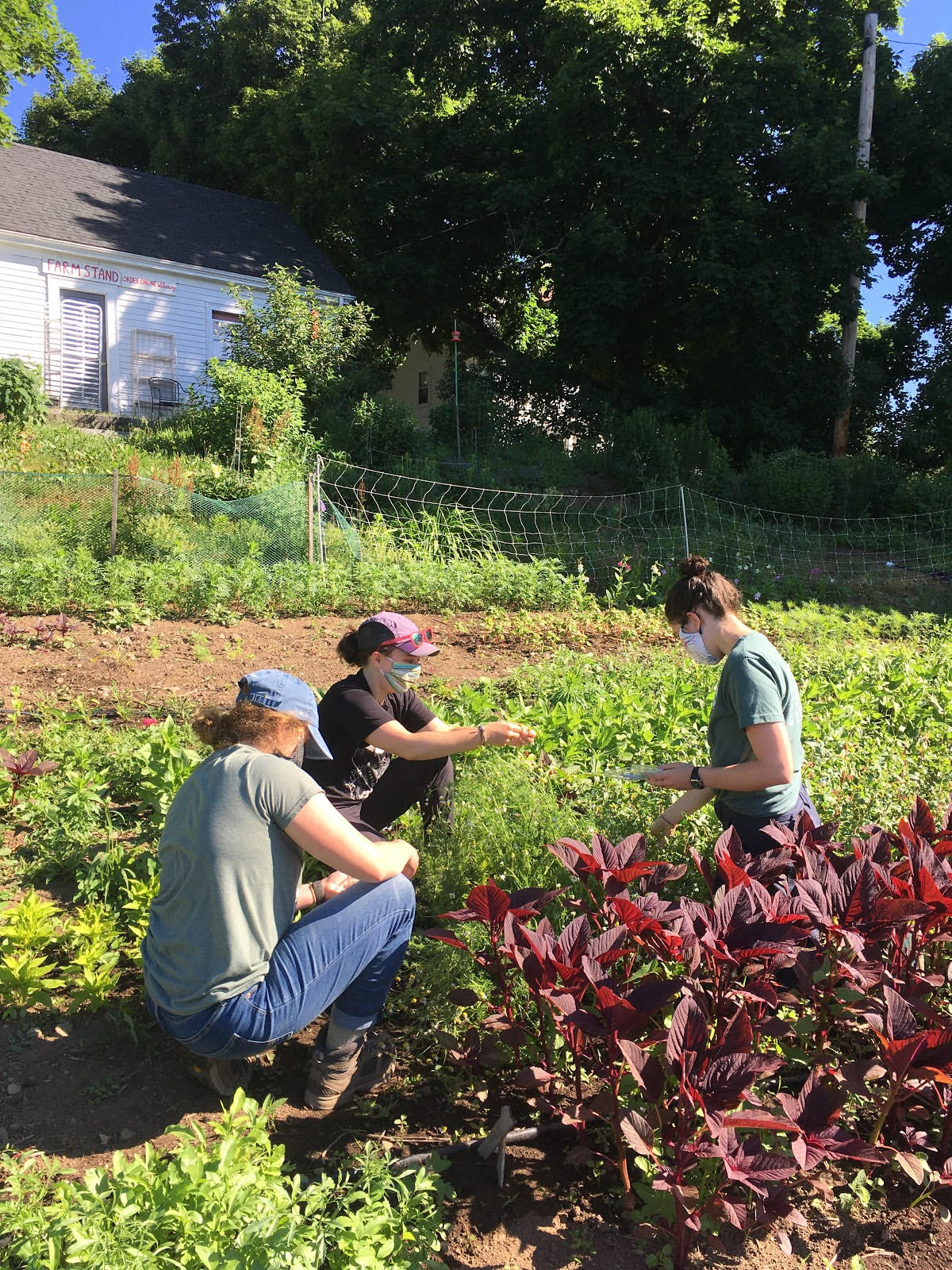
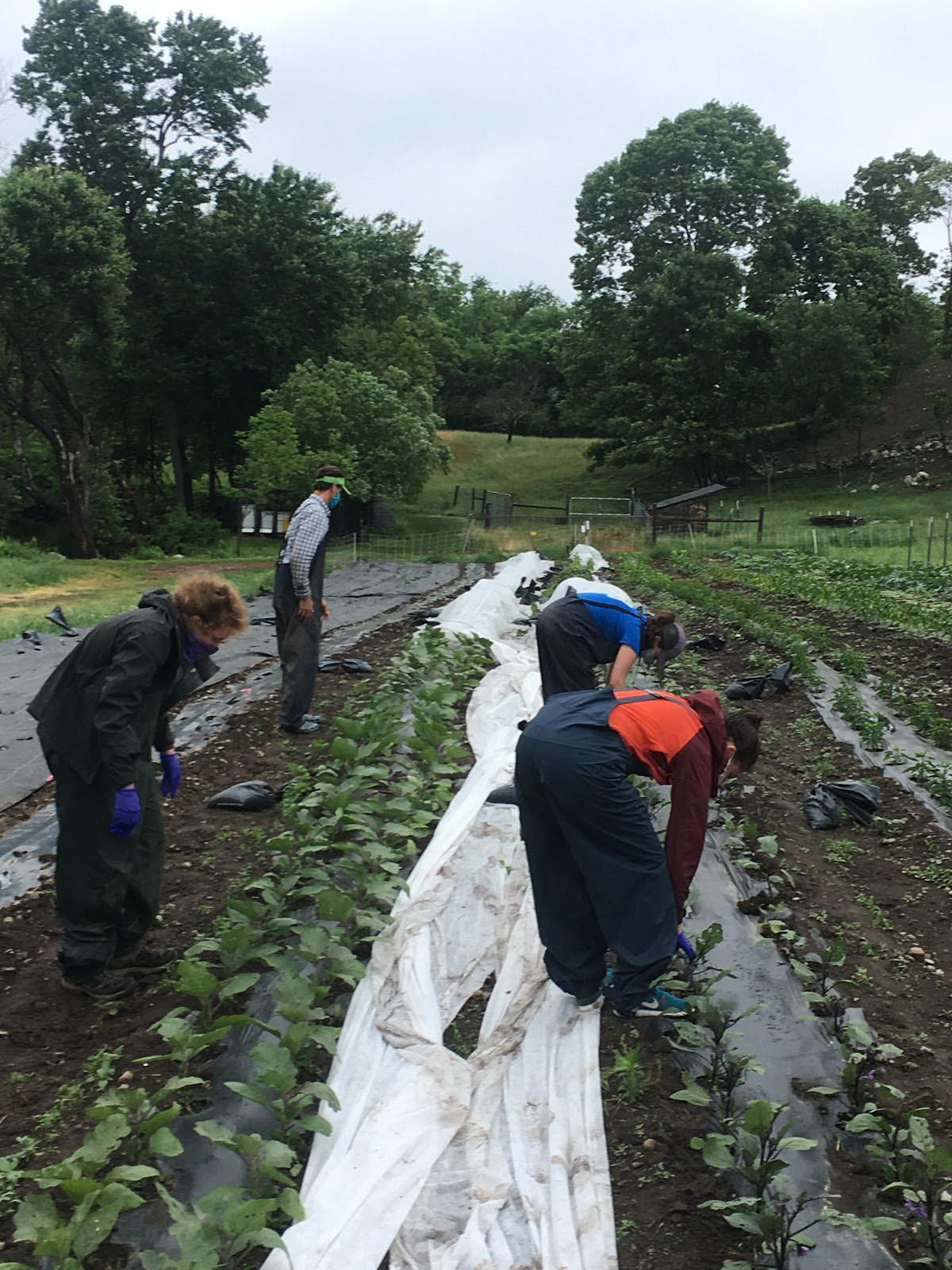
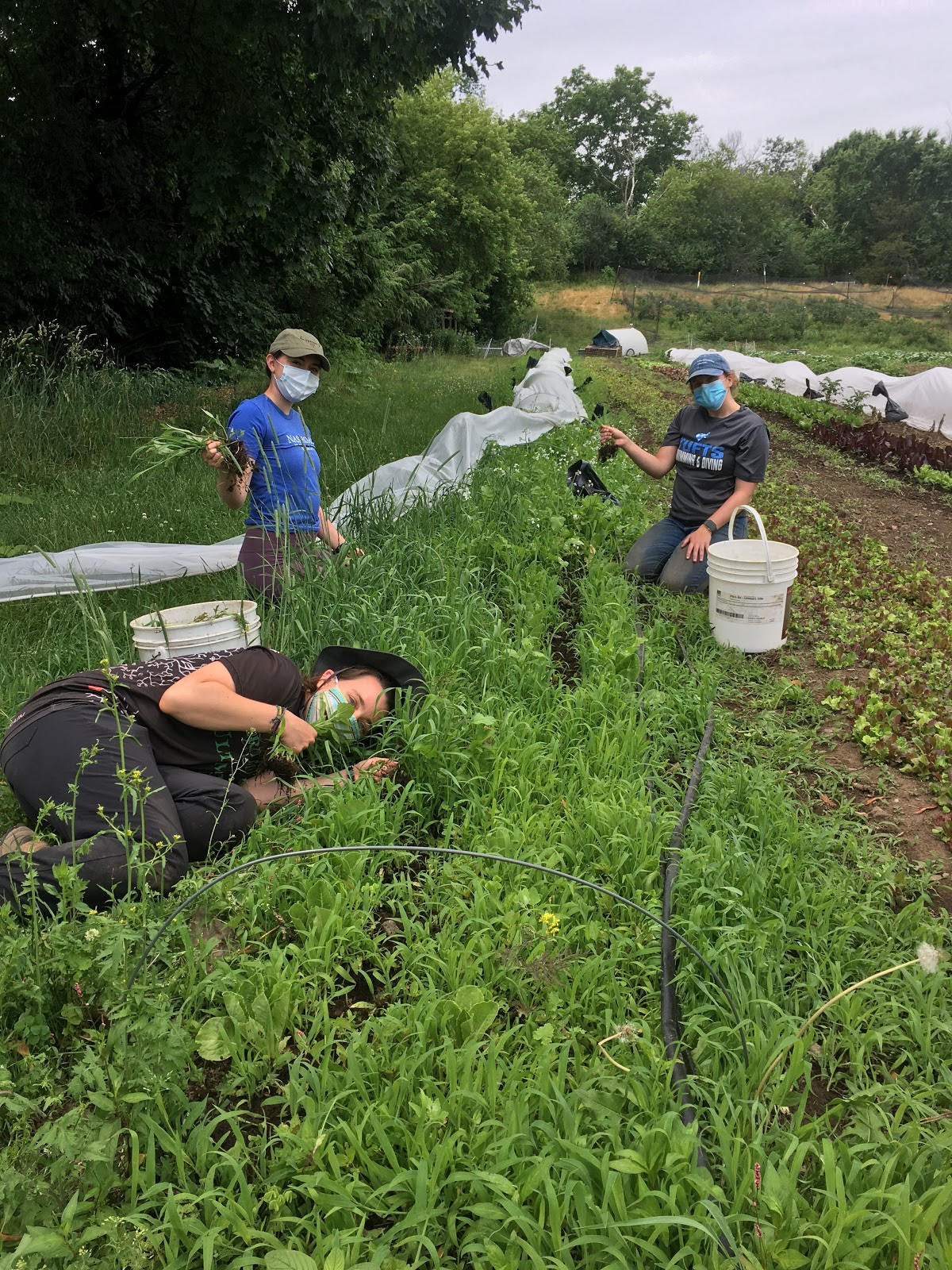
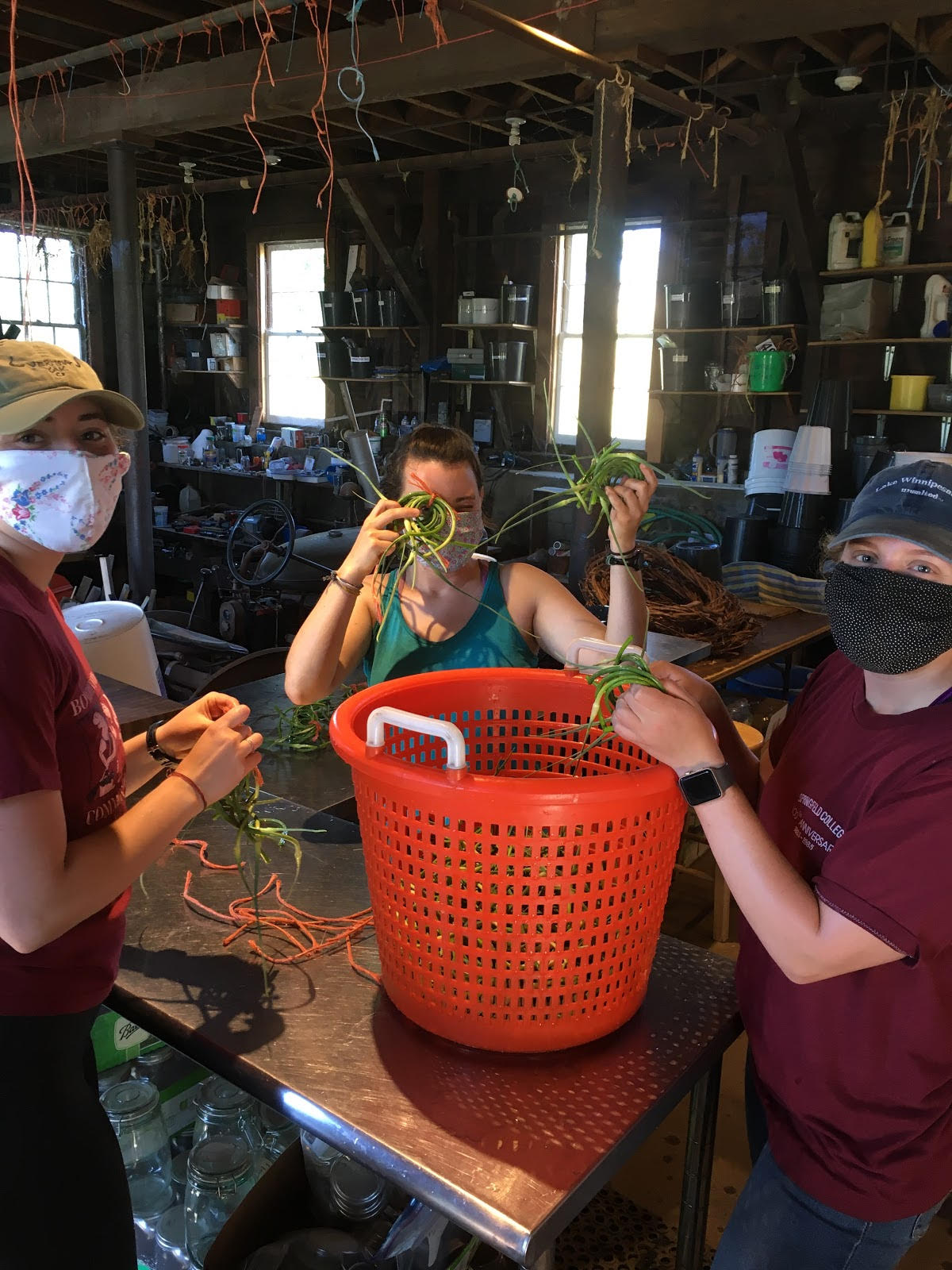
Melissa Gordon (Graduate Student, Tufts University, Friedman School of Nutrition and Science Policy):
It was our third day on the farm, week two, and the carrot and beet beds needed to be rid of weeds. The farm crew was already positioned around the beds, and we were tasked with joining them to move the irrigation tape out of the way so Adrienne could pass on the tractor, and then put it back in place so it wasn’t in the way of the next row. After hours of sitting together (us three interns and our supervisor Erika) hand-weeding the cilantro and dill, it was a joyful change of pace to work on a job with the whole team. We shouted to each other from opposite ends of the bed and watched Adrienne riding high on the massive vehicle, adept at ensuring the tires stayed in the aisles, and the forks stayed between the rows of baby plants. Though moving irrigation tape out of place and returning it wound up being one of my least preferred jobs on the farm, the fact that we were doing it as a part of the full farm team made it one of my favorite afternoons. Later in the summer we worked with the farm crew on a rainy day to bundle the garlic and hang it from the Squash House ceiling, and on our last day we joined together to assist with the honey extraction from the beehives. I love feeling part of a community and a team, working together to achieve a goal!
There was also a different, but equally memorable, sense of accomplishment on another day: the first time Adrienne assigned us each individual tasks. “Rachel: fill these clamshells with big basil leaves; Sophie: harvest mint from next to the barn; Melissa: pick some more chamomile flowers.” It was an indication she trusted us and believed we could take on responsibility to be the one person providing a certain item for the market later that afternoon. As the summer continued, and Adrienne gave us less direction for some tasks—only needing to name the crop to harvest—I felt this sense that she could rely on us to know what to do. Of course, with just one part-time summer under my belt, there are infinitely more jobs I need detailed direction for than ones I can do on my own. And to be sure, though I liked jobs on my own and with the full crew, what kept me looking forward to every day on the farm was working alongside my co-interns—I was really pleased that I enjoyed their company and collaboration so much. Over these ten weeks, we’ve learned a lot, and both as individuals and a team, we’ve become a part of the workings of Wright-Locke Farm.
Rachel Marston (Undergraduate Student, Tufts University):
Every day, I came home from Wright-Locke covered in dirt from head to toe. I’d run straight for the shower to rinse it all off; sometimes there was so much it’d leave a nice layer of dirt in our poorly draining tub, much to the dismay of my housemates. This was what had always deterred me from farm work as a young adult. I’d never been much of an outdoorsy kid – let alone one who liked to get dirty. Don’t get me wrong, I’ve always loved nature, but growing up as an only child in the sweltering south had meant I’d spent more time seeking air-conditioned sanctuary rather than digging in the dirt. I didn’t discover my affinity for the outdoors until my teenage years, eventually settling on an environmental studies college major and slowly edging towards a focus on sustainable agriculture. That’s what brought me here, to Wright-Locke, to inform my studies and experience farming in practice rather than merely through a lecture hall.
This summer – instead of seeking solace indoors, as in my childhood years – the dirt became strangely comforting to me. As a disclaimer, I don’t want to romanticize agricultural work – it’s far from a pastoral fantasy – and I possess the privilege to embrace the difficulty of farm work as a positive aspect of the experience. As Sophie mentioned in her post, one of my main takeaways from the summer is the immense amount of labor it takes to successfully grow a single vegetable, let alone a full CSA box or a field full of various crops. Yet, it was precisely this difficulty of the work, the grind of the day, that became so soothing to me. Perhaps it’s the ex-endurance athlete in me or my need to constantly be doing something productive, but the task-oriented, nose-to-the-grindstone nature of farming was good for me even whilst wrecking my body. Beyond my own mental and physical reactions to farm work, this internship provided a concrete idea of what it takes to run a farm. Aside from labor, it takes an immense amount of teamwork and trust to keep a farm running. I learned that this intensity and togetherness creates incredible bonds amongst the farm crew; I feel so grateful to have worked with such lovely people who always challenged me to think outside my comfort zone. I definitely learned as much from the people as I did from the land. Looking forward, this summer’s amalgamation of experiences has definitely encouraged me to continue to zero in on food systems work, centering on equity and anti-racism in agriculture. Though Wright-Locke, as a small, event and education-oriented New England farm, occupies a quite specific role in the food system, I feel fully able to apply what I’ve learned this summer on a broader scale. I feel much more ready to engage in informed thought about sustainable, equitable agriculture on all scales, from small farms to big agribusiness!
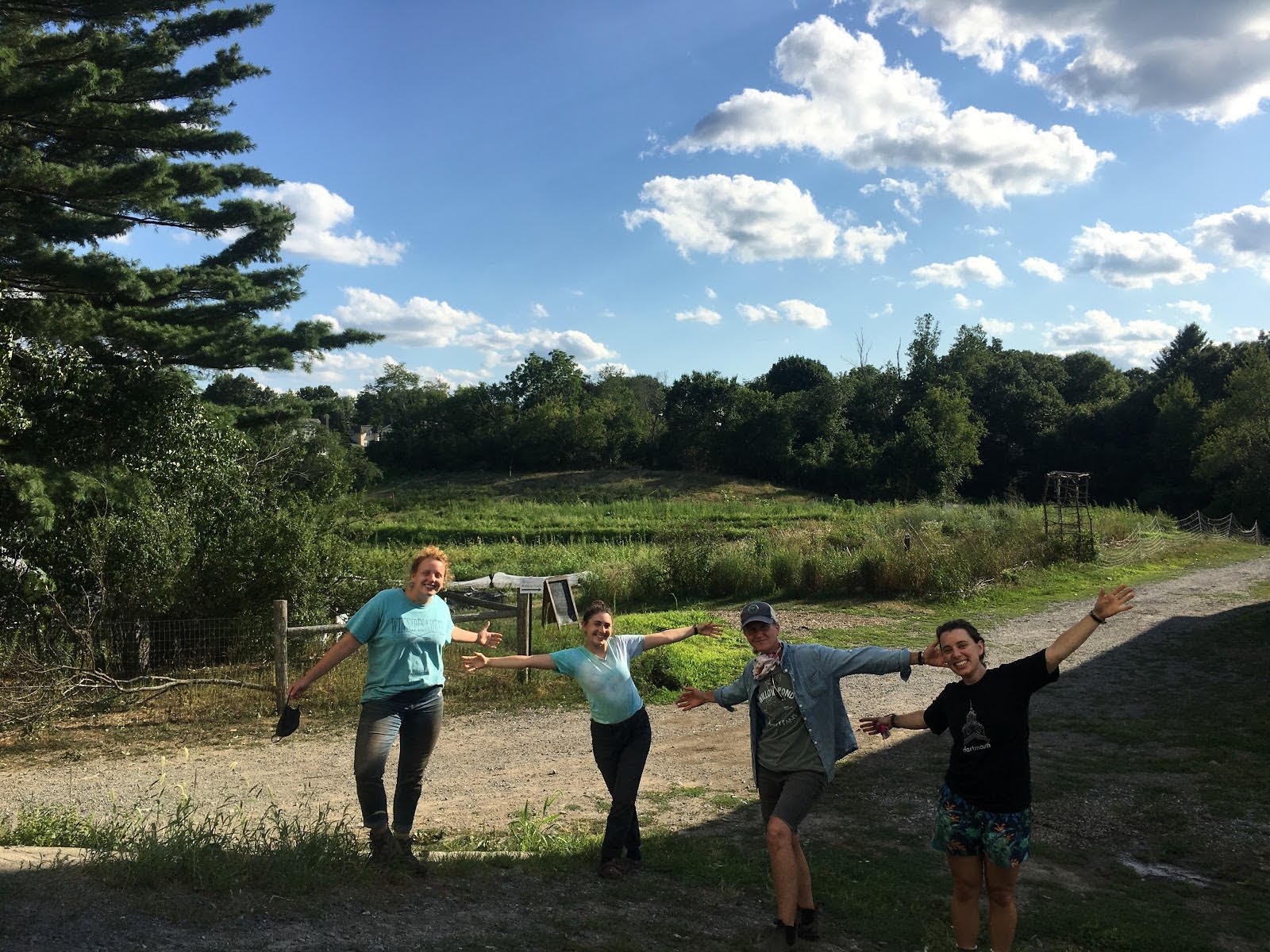
Pictured Left to Right: Rachel Marston, Sophie Lewis, Erika Gorgenyi, Melissa Gordon